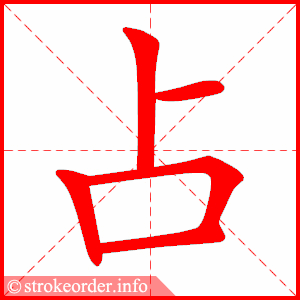Animated Stroke Order of 占:

Radical:卜 Strokes:5
Pinyin & Definition:
| zhàn | to take possession of/to occupy/to constitute/to make up/to account for/占 sometimes used as traditional character |
| zhān | to observe/to divine |
| zhàn | to take possession of/to occupy/to constitute/to make up/to account for/佔 sometimes used as traditional character |
Related Chinese characters:
Words with Chinese Character 占: